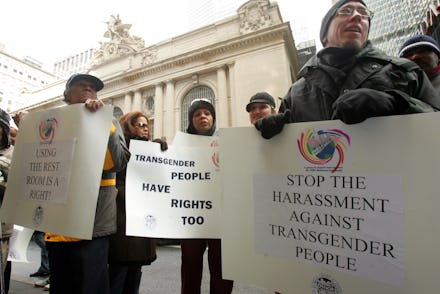How Discriminatory Bathroom Bills Hurt Transgender and Gender-Nonconforming Students Most

A swift and dangerous wave of legislation targeting transgender people is spreading across the country.
On March 23, North Carolina Gov. Pat McCrory signed a discriminatory bill into law that makes the Tar Heel State the first in the nation to ban transgender and gender-nonconforming people from using public restrooms that align with their lived identity. But while the North Carolina bill is broad in scope and rolls back basic protections for both gay and transgender people alike, most of this vitriolic legislation is aimed more squarely at transgender and gender-nonconforming students in our public schools.
In Kansas, Governor Sam Brownback signed a "religious freedom" law on March 22 that permits student groups at public universities to engage in discrimination against LGBTQ classmates without penalty. On top of that, the Kansas state legislature is considering a bill that would allow students to sue a school for $2,500 every time they witness transgender classmates using a bathroom that doesn't match the gender they were assigned at birth. And bills like those in North Carolina and Kansas have already been filed in more than two dozen state legislatures this year. This disturbing trend should raise a red flag for the entire LGBTQ movement, about how much work we still have to do together as a community, especially to protect the next generation.
The Kansas bill, and similar ones pending in state legislatures across the country, aim to bar transgender and gender-nonconforming students from using a school restroom or locker room that matches their lived gender. Proponents of these harmful bills claim that they seek to protect our young people, and yet the result is to force students to use unsafe school facilities that don't align with who they truly are, placing them at greater risk of harassment and violence. Even worse, school systems will be mandated to violate students' privacy and condone, even promote the disrespect, bullying and harassment of transgender and gender-nonconforming students. What kind of message does that send to students?
Bathroom battles are more than symbolic: For most, the question of which bathrooms you're allowed to use may seem like a trivial issue at first glance. But battles over bathrooms and other kinds of public accommodations have played a leading role in many past civil rights campaigns. Women fought hard for bathrooms as they broke into the workforce decades ago. Disability rights activists battled for accessible public spaces. Civil rights activists literally put their lives on the line to do away with the white-only schools so emblematic of Jim Crow segregation. These struggles weren't just about public accommodations — they were about who deserves to participate in our society. The fights in North Carolina, Kansas and elsewhere are no different.
The impact of such regressive laws on transgender and gender-nonconforming people alone should motivate all of us who care deeply about our education system to combat this brand of discrimination wherever we see it. We already know these young people face an uphill battle at school. Students who experienced higher levels of victimization because of their gender expression were more than three times as likely to have missed school in the past month, according to the Gay, Lesbian & Straight Education Network's 2013 National School Climate Survey. Even worse, students victimized for their gender expression had a lower GPA (2.9 vs. 3.3) and were twice as likely to report that they did not plan to pursue any post-secondary education. Not surprisingly, these very students were also reported to have higher levels of depression and lower levels of self-esteem.
When elected officials pass laws governing what kinds of school facilities students can or cannot use, that state sends a dangerous message to an entire school community that any student who simply doesn't conform to antiquated and stereotypical ideas of gender are somehow not deserving of our respect.
That's why young people who express their gender differently are counting on us to stop the passage of harmful and backwards bathroom bills across the country. And that's why we need to continue building a culture where all of our differences are recognized and valued.
Transgender and gender-nonconforming students who have the courage to express their true selves deserve to be treated with dignity and respect from the very institutions charged with fostering their academic growth and well-being. And all of us owe it to our children to instill in them the values of acceptance, openness and respect for all kinds of differences, which will serve them well on the path toward adulthood.
Mara Keisling is the executive director of the National Center for Transgender Equality. Kevin Jennings is the executive director of the Arcus Foundation.